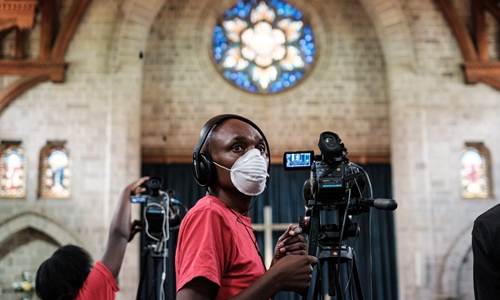Kenyan tailors get busy as country embraces masks to fight COVID-19
Source:Xinhua Published: 2020/4/15 16:13:40

A media staff member wears a mask in Nairobi, Kenya on April 10. Photo: AFP
Green, yellow, white and blue are among the variety of colors of face masks being sold in Kenya in the fight against COVID-19.
The materials used to make them include cotton, polyester and translucent lining.
The masks are now in huge supply across the east African nation, days after the government made it compulsory to wear them in public to curb the spread of the novel coronavirus.
Health Cabinet Secretary Mutahi Kagwe on April 6 gazetted laws that make it a crime to be in public without face masks. Anyone found culpable risks a fine of 20,000 shillings ($200) or six months in jail.
At the center of the production of masks - some stylish - are tailors across the east African nation.
The garment makers have seized the opportunity to make the gadgets that were in short supply due to disruption of global trade, boosting Kenyans' war against COVID-19.
"It takes about 10 minutes to sew each mask after measurement has been done and the size cut," Moses Oduor, a tailor in Kitengela, south of Nairobi, the capital, said on Monday.
Oduor observed that for the past one week, he has suspended any other work at his tailoring shop to make the masks.
"We are three of us. We took the work as urgent and started production of the reusable masks," he said.
He has employed a marketing agent to walk around the sprawling urban center selling the masks at different prices depending on the design.
"Our targets are traders at market, motorbike riders and commuters at bus parks," said Oduor, adding, however, competition is tough as many people are selling them.
In Kakamega, in western Kenya, tailor Florence Mwaka said she started producing the gadgets last week, but has since temporarily stopped when the county government started to issue free masks, especially to small-scale traders and motorbike riders.
"I will resume in a week's time when demand will have started going up since most of the people who have received free masks would have disposed theirs," said Mwaka, who sells the masks.
While encouraging Kenyans to wear masks, President Uhuru Kenyatta on April 6 asked tailors to help the country produce the gadgets to increase supply and thus lower prices.
"There would be thousands of tailors, who will make the masks and earn a living, but they will be guided on how to do it," he said.
However, not only small tailors have taken Kenyatta's calls with gusto, in eastern Kenya, a textile factory run by the Kitui county government has won praise for stopping all its activities to produce some 30,000 face masks a day.
Most of the masks being made by the factory named Kitui County Textile Centre (Kicotec) are being bought by counties, national government, NGOs and corporations for distribution to vulnerable groups and workers.
The factory has employed at least 400 tailors, mostly women for the work that involves cutting the fabric, stitching and packaging, and also makes personal protective gears for health workers.
"We are doing everything possible to produce the necessary gear for our people and medical personnel, who are on the frontline fighting for us and the nation especially during this time of the pandemic," said Kitui governor Charity Ngilu.
Ernest Manuyo, a business lecturer at Pioneer Institute in Nairobi, noted that Kenya's production ability has been brought out by the COVID-19 crisis.
"Initially, these masks were being imported but Kenya has now resorted to local production which means creation of jobs and thus building the local capacity. This is one of the positive things to come out of the crisis and should be sustained," he said.
Newspaper headline: Shifting gears
Posted in: CULTURE & LEISURE